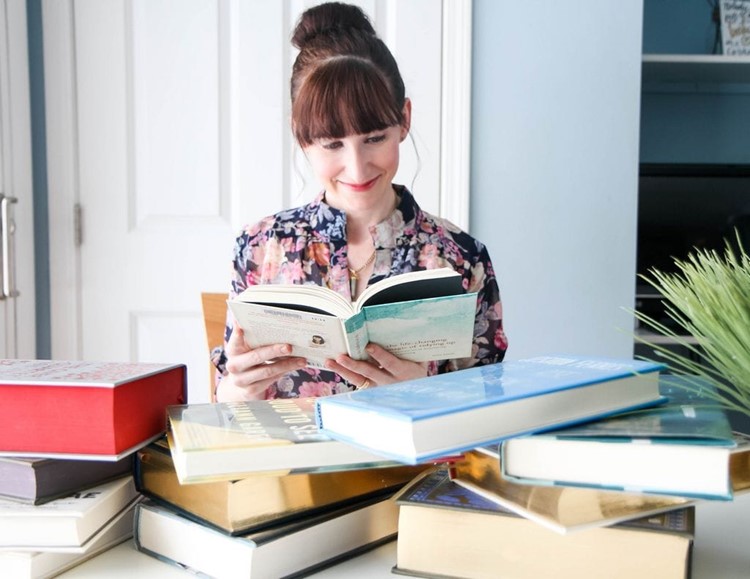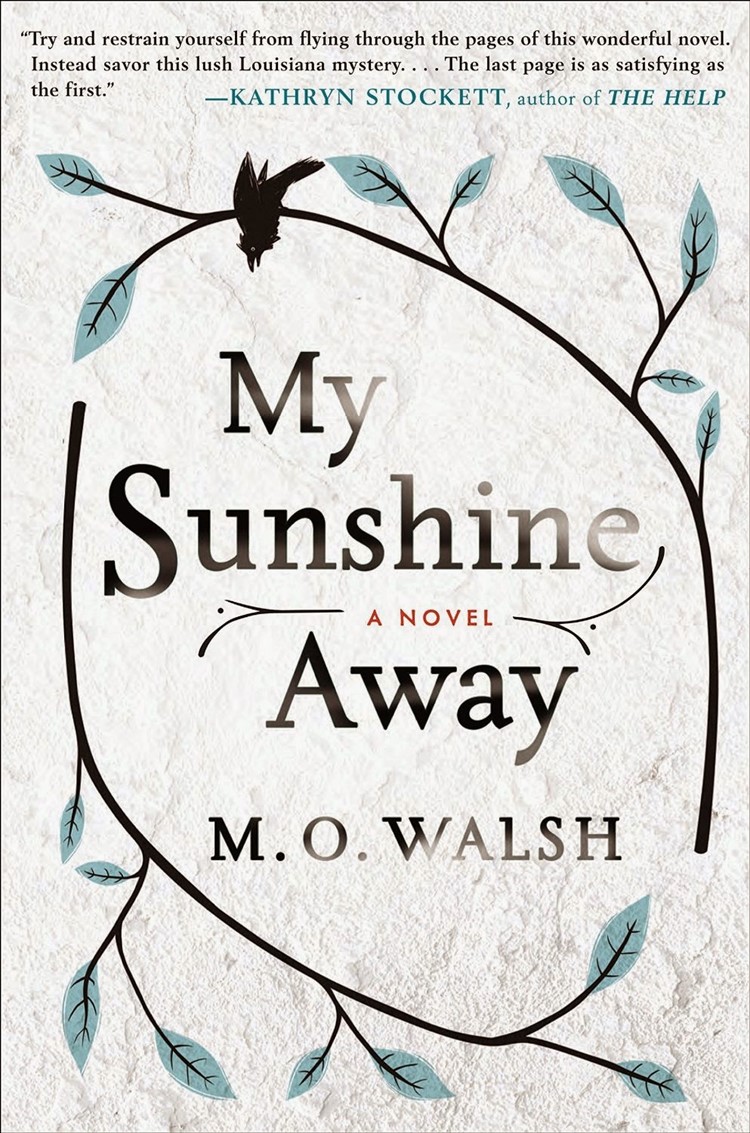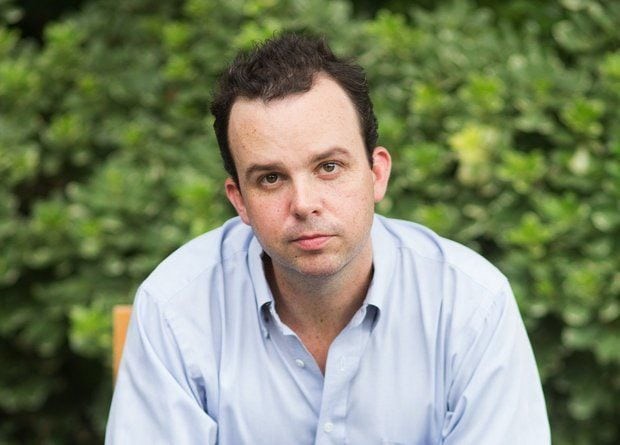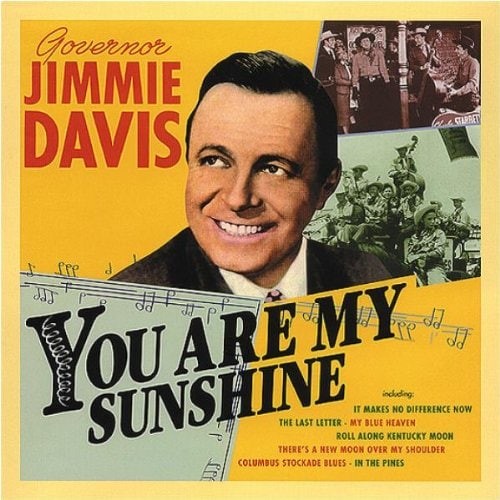
Sundays are just made for curling up with a great book and today I am excited to feature an interview with a new author that has created a lot of buzz with his debut novel, My Sunshine Away. I selected this book while browsing this past month’s selection for the Amazon Featured Debut Novel category. I picked it up and immediately emailed the author to see if I could interview him about his book, the process of writing poetically, the buzz about his debut novel, and some interesting insights on the town he lives in (Baton Rouge) that can be found within this book. I simply love his responses to my questions and the honesty with which he writes.
Before we begin, I know you like me to disclose this in our book reviews and interviews so the book featured today does have sex and language in it. This doesn’t make me shy away from a book unless it is simply for shock value and that is definitely not the case in this book. I really liked this post from Modern Mrs. Darcy that can help explain why I choose the books I do (I echo her sentiments completely).
I also loved what M.O. Walsh, our author today, says about his writing. He says, “If a writer is concerned about the reception of their work more than the creation of it, then they are likely to mitigate this honesty in a way that makes for a weaker book. And, if their unmitigated honesty eventually upsets people or disturbs them, then I think that’s ok. We can only understand what we cherish by recognizing what it is that unsettles us. I think that’s a large part of the function of art, actually, to be unsettling.”

My Sunshine Away is one of those books that you just swim in the words thanks to such a gifted writer. M.O. Walsh does an incredible job of setting the typical suburban neighborhood scene in the year of 1989. It’s the summer that changes everything when the town’s golden girl, Lindy Simpson, is attacked at night near her home. Told in the eyes of another neighborhood boy, who has an extreme obsession & fixation on Lindy, he tries to set the scene and name the suspects…even when his name is included among the list. Although, perhaps, not satisfying in the way that a typical whodunit mystery is solved, it is genuinely satisfying in capturing the mind of an adolescent boy, a bittersweet relationship between him and his father, and that tricky terrain of adolescent love and obsession. I really enjoyed this read and I look forward to sharing more about the author behind the story.
Grab your coffee and let’s settle in for a chat with M.O. Walsh today!

Congratulations on your debut novel and I am so excited to see that it was selected as Amazon’s Featured Debut Novel for the month of February along with being a New York Times Bestseller, Entertainment Weekly’s “Must” for 2015, an Indie Next Pick, and a Library Journal Essential Debut. How long did it take you to write this incredible book and what has it been like to have it so well received once it has been released into the world?
Thanks! I really appreciate all of your support and excitement. I worked on this novel for about 7 years, so it has been really gratifying to see it actually make its way out into the world. All of the really generous reviews and press have been humbling, to say the least. I think when you write a novel, you focus so much on trying to make it as good as you possibly can that you become, undoubtedly, your own toughest critic. So, when people say nice things about your writing, at least for me, it’s kind of surprising. It’s not surprising in that I thought it was a bad book, it’s surprising in terms of me thinking, “Wait, you read my novel? That’s been sitting on my computer for 7 years. How did you get a copy of it?” Ha.
Was the story of Lindy Simpson based upon any events that happened in your own life or was this just a story that you wanted to explore creatively?
Both, actually. I grew up in a neighborhood similar to the one in the novel and can remember overhearing a story about a young girl on our street being attacked one night. I was way too young, however, to understand what this meant when I originally heard it (I was just a kid who wanted to play outside and nothing else). So, I kind of stashed the story away in the back of mind like people do. Then, the older I got, the more I couldn’t help thinking about how strange it was that a place that I thought of so nostalgically and wonderfully could have possibly been so horrible to another child my age. So, instead of asking my mom about it, or doing any research into the actual event, I decided to explore it creatively through fiction.
Your story takes place in Baton Rouge, which is a town that I understand you are quite familiar with since you live and teach there. There are sections of your book that are really devoted towards the feelings of the people of Baton Rouge after Hurricane Katrina strikes and the struggle with supporting the people of New Orleans through that. There is also a lot about how the town felt in the aftermath of the storm. Were these just feelings of your character or do you feel like these are your feelings and you are echoing the sentiments of people of Baton Rouge as a whole? Do you feel like the town is still recovering from Hurricane Katrina?
I think a lot of places are still recovering from Hurricane Katrina. New Orleans is the obvious example, and deservedly so, but there are also smaller coastal towns that have never recovered and larger cities like Baton Rouge and Shreveport and Houston who saw some real shifts in their demographics as a result of the Katrina refugees. I think many of these cities simply had to come to grips with a new reality in the wake of this population growth. I can’t speak for them, nor can I speak for Baton Rouge as a whole. However, since I’ve spent most of my life in Baton Rouge, and since it’s where the narrator is from, and since the narrator is very aware of the differences between New Orleans and Baton Rouge and the differences between him and the main character Lindy Simpson, I felt it was a subject ripe for exploration. The truth of the matter is that not many people have told Baton Rouge’s side of the Katrina story. And, since this narrator got an opportunity to do so, when telling his own personal story, he went for it.
The narrator of your story is also a potential suspect in the rape of Lindy Simpson. Why do you think it was important to tell it from his perspective, a neighbor boy obsessed with Lindy himself?
This is a hard question for me to answer because I never really conceived of the novel in any other way. I think a large part of what attracted me to the story as a whole was the narrator’s compulsion to confess to something. I’m definitely not a crime writer or mystery writer, have never really read many books in those genres, so I was operating only under the simple premise that the narrator had something he desperately needed to tell the reader. That, I think, drives much of the story. Looking back at it now, I can see other reasons why the perspective is important but, again, it’s hard to quantify because the entire book would be different, I think, if the perspective changed.
Writing about rape and sexuality has to be a tough and ambitious first topic to tackle in a debut novel. Were you scared how this story would be received? Were the more graphic & messy scenes difficult for you to write as a writer or do you just go in that place and let the words go?
I never thought of myself as writing about rape. I’m definitely not qualified to do that. I was just trying to tell this one person’s story. In that way, I was never really scared about what the reception might be. The only thing that makes fiction work, I think, is honesty. Pure, raw, you-can’t-tell-anyone-else-I-told-you-this honesty. If a writer is concerned about the reception of their work more than the creation of it, then they are likely to mitigate this honesty in a way that makes for a weaker book. And, if their unmitigated honesty eventually upsets people or disturbs them, then I think that’s ok. We can only understand what we cherish by recognizing what it is that unsettles us. I think that’s a large part of the function of art, actually, to be unsettling. That said, I did not set out to accomplish anything as grand as that. I just wanted to tell a good story with good sentences, and I find that plenty challenging enough.

Why did you title your book, My Sunshine Away and what is the significance of this title in telling your story?
This is taken from the song You Are My Sunshine, made famous by two time Louisiana governor Jimmie Davis. This is also the state song of Louisiana. So, when kids grow up here, they learn to sing this song at a very young age. You’ll often hear classrooms of kindergarteners singing this at Grandparent’s Day or the like, and it is a great big happy sound. However, once I got older and learned the verses to the song, I realized that they were full of sadness and, some might argue, even menace. So, the song made a lot of sense to me in the way the narrator looks back at his youth. The overall impression of his youth and neighborhood is a happy one, like the chorus, but the details are as sad and troubling as the verses to the song itself.
It is no surprise to me that you are the Creative Writing Workshop director at the University of New Orleans because your words practically sing off the page and have a poetic nuance that reminds me of Anthony Doerr’s poetic phrasing in, All the Lights We Cannot See. Who are your biggest influences in your writing and is this something that you are just born with or does writing poetically take a lot of practice?
I’ve actually just read Doerr’s book and so I understand what a tremendous compliment this is. I think that novel is amazing. So, thank you! My own literary influences are really all over the place. I learned a lot from sentence writers like Barry Hannah. I learned about setting from people like William Faulkner and Willa Cather. I also greatly appreciate the imagination of people like Italo Calvino. I think every writer has kind of a grab bag of people they learn from. However, my main influence is definitely a writer named Lewis Nordan. He was a guy from the Mississippi delta whose books Music of the Swamp, Wolf Whistle and Sharpshooter Blues absolutely recalibrated the way I thought that people could write about the South. In a literary tradition so full of gritty and violent men, Nordan’s main characters are often highly sensitive and whimsical boys trying to navigate the odd terrain they’ve been born into. His enormous sympathy for his characters really resonated with me and I feel I would be a different person in life, not just as a writer, if I’d never read him.
I definitely think that some people are born with sort of a writer’s eye. They inherently see connections and potentials for stories where others don’t. However, I think that actually learning to write fiction well takes a tremendous amount of practice and dedication. I’ve basically been doing nothing else for the last twenty years of my life and I still don’t feel like I have a full grasp on the craft. I don’t know that anyone does. It’s an incredibly difficult and puzzling process, writing fiction. I think that’s what ultimately makes it a worthwhile pursuit. It’s an honor for me to try and help other writers get their vision out into the world. I’m happy to do it.
If you could tell anyone to read one book (other than your own) what would that book be?
This answer would likely be different on any day you asked me. There are so many great books out there! Right now, however, I will say Their Eyes Were Watching God by Zora Neale Hurston. I’ve found myself missing that book lately, sort of yearning to go back and re-read it for maybe the 12th time. Who knows why? This is the great mystery of beautiful fiction; it speaks to us in fundamental ways that we ourselves don’t always understand. It’s a glorious thing.
You can connect with M.O. Walsh on Facebook and through his website. I’m always thankful for these moments with writers and I hope you will pick up this amazing book! You can always connect with me on GoodReads,through our books section of our site, and you can read our entire Sundays With Writers series for more author profiles. Happy reading, friends!
*This post contains affiliate links!
Pin It